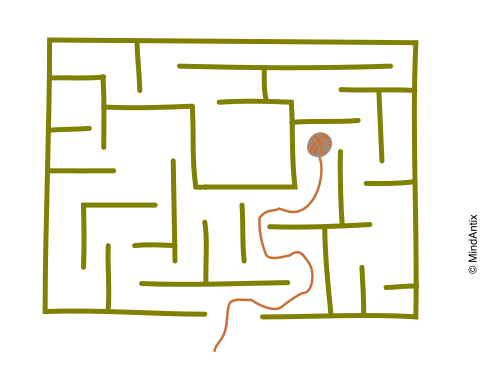In the Greek mythological tale of Theseus and the Minotaur, Theseus sets off to battle the Minotaur, a half-man half-bull creature, who lives in the heart of the Labyrinth. As if fighting the Minotaur wasn’t a challenge in itself, Theseus’s problem is compounded by the fact that no one had ever gotten out alive from the confusing Labyrinth. To help him survive, Ariadne, Minotaur’s half sister, gives him a ball of yarn. Theseus ties one end of the yarn to the entrance of the Labyrinth, gets to the center of the Labyrinth, kills Minotaur, and uses the yarn to find his way back.
The origin of the modern-day word “clue” comes from the Greek word “clew”, which means a ball of yarn. Once you know the story of Theseus and the Minotaur, the meaning of the word “clue” becomes more or less obvious.
Etymology, or the study of the origin of words, is a fascinating field that illuminates the meaning words through the historical stories behind it. Given that English is a potpourri of many Latin, Romance or Germanic words, an etymological analysis often helps understand the ideas behind the words and their spelling patterns. Various studies have shown that students who study English as a Foreign Language (EFL) often retain vocabulary better when it is enhanced with etymological details.
One such study found that when faced with unfamiliar idioms, students were able to use etymological information in figuring out the meaning of the idioms. The authors believe that this problem solving activity also enhances the mnemonic effect, which in turn helps with better retention. In another study, researchers found that participants who received etymological elaboration performed better in learning than the participants who just relied on rote memorization.
Word ORIGINals is a new MindAntix brainteaser that combines etymology, creativity and the mnemonic effect to aid vocabulary building. Not only does each brainteaser give the etymological information for a word, it also allows you to create your own story of how you think the word came into existence. By making your own story, you create your own memory tool rich with images and meanings that can help you remember better.
Ralph Waldo Emerson once said, “The etymologist finds the deadest words to have been once a brilliant picture. Language is fossil poetry.” But you don’t have to just stop at discovering the picture, you can also add your own dash of color to it!

